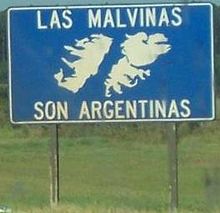 |
| Watching penguins in the Falklands. (Photo: Falklands Islands.com) |
Besides drugs, another issue sure to be discussed at the Summit of the Americas will be the windswept archipelago off of the Argentine coast, called the Falklands Islands by the British and the Malvinas by the Argentines and most of Latin America.
They're frigid, windy places with a few thousand people and lots more sheep. But they have economic value in the fisheries and hydrocarbons in the waters around them. And, even more value in terms of national pride.
They're also suddenly relevant to Colombia, because Colombia has friendly diplomatic and commercial relations with both nations claiming the islands, and would have a hard time choosing sides. In fact, some other Latin Americans labeled Colombia a traitor against its Latin neighbors because it didn't back Argentina against Britain in their war over the islands 30 years ago.
 |
| Sunny San Andrés. |
The San Andres archipelago once made geographic sense for Colombia. But after U.S. Pres. Teddy Roosevelt encouraged Panama to rebel and made it into a separate country in order to dig a canal, the archipelago stayed with the rest of Colombia, stranded off of the Nicaraguan coast.
 |
| A sign in Argentina says 'The Malvinas are Argentinean." |
In fact, both Argentina's and Nicaragua's claims are outdated exercises in nationalism. If geography trumped a place's history of continuous occupation, then we'd need to carry out wholesale transfers of territory all around the world, including giving Alaska back to Russia (or Canada) and Spain hand the Canary islands over to some West African nation. Many of the little pieces of land dotting the Caribbean Sea and Pacific Ocean would change ownership, creating a sort of international chaos. Right or wrong, that isn't going to happen.
 |
| Just like home: A church in the Falklands. |
The residents of San Andres and the Falklands feel respectively Colombian and British. Both nations appear to administer competently their far-away possessions and the islanders haven't expressed a wish to change nationalities. Until they do, it's best to leave well enough alone.
The legality of their claims aside, the Nicaraguan and Argentine positions also look like lost causes. In military terms, Colombia and the United Kingdom are the much more powerful nations, as Britain demonstrated by retaking the Falklands 30 years ago. The Argentine dictatorship's military invasion of the Falklands, and the thousands of military casualties, turned the islands' sovereignty into a matter of national pride, and thus probably eliminated any possibility of a negotiated settlement. Since then, to its great credit, Argentina has slashed its military budget, making another military adventure unthinkable.
Someday, however, geography and migration may accomplish what arms and diplomacy have not. The British government says that the people of the Falklands should be able to decide their nationality. It turns out that the waters surrounding the Falklands may contain considerable natural gas and petroleum. If those are exploited, the invasion of workers could change the islands' population from Anglo Saxon to Latino - and at the same time perhaps the people's national loyalty.
By Mike Ceaser, of Bogotá Bike Tours




No comments:
Post a Comment